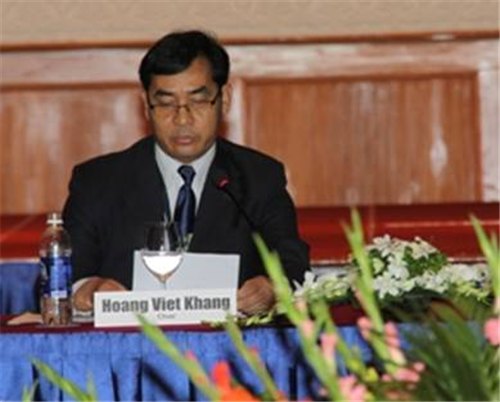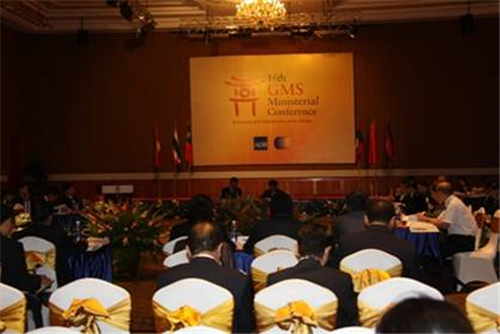(MPI Portal) – In the morning of August, 19th, 2010, the Senior Officials’ Meeting (SOM) of Greater Mekong Subregion (GMS) took place under Mr Hoang Viet Khang’s chairmanship, Deputy Director General of Department of Foreign Economic Relations, Ministry of Planning and Investment, GMS National Coordinator in Vietnam and Mr Kunio Senga, Director General of Southeast Asia Department, ADB with the participation of 42 representatives from 21 multilateral and lateral development organisations, inter-governmental organisations, private economic partners, GMS Senior Officials and ADB experts.
 |
|
Mr Hoang Viet Khang, Deputy Director General -Department of Foreign Economic Relations, Ministry of Planning and Investment speaks at the Conference. Photo: Thuy Quyen (MPI Portal)
|
In his opening speech, Mr Khang said: “We were very pleased with the interactive dialogue between the development partners and the GMS countries. Through the discussions, GMS obtained a good perspective on the development partners’ priorities. At the same time, the development partners got a clearer picture of the GMS Program and the needs of its member countries”.
Development partners indicated strong interest to continue engagement with GMS countries in addressing financial, policy, institutional, procedural, and institutional capacity issues. Some of the common areas of interest mentioned are transport and trade facilitation; environment and climate change mitigation and adaptation to address natural disaster concerns; integrated water resources development in the Mekong basin; agriculture fore trade (food quality and food safety) and food security at the local, regional, global levels; rural renewable energy; human resource development; safe migration initiatives; support to subregional institutions like the Mekong Institute and the Mekong River Commission; and enhancement of public and private partnerships.
|

|
|
The Conference panorama. Photo: Thuy Quyen (MPI Portal)
|
GMS Senior Officials agreed that the Conference theme “GMS in the Next Decade: New Frontiers of Cooperation” is strongly relevant to the current situation of GMS economic cooperation. The Program needs to address emerging issues and challenges, while building on the momentum of GMS cooperation.
The SOM noted the strategic directions, priorities and issues for the GMS Program, and carefully reviewed six strategic initiatives as follows:
- the Program of Actions for Transport and Trade Facilitation (TTF), which is essential to enhancingGMS competitiveness and accelerating transformation of transport corridors into economic corridors;
- the Strategic Framework for Connecting GMS Railways, which is a significant first step toward an integrated GMS railway system;
- the Strategic Directions and plan for the development of Phase II of the GMS Core Environment Program (CEP) – Biodiversity Conservation Corridor Initiative (BCI). The four strategic directions are (a) biodiversity conservation and poverty alleviation, (b) climate change, (c) rural environmental management, and (d) capacity building;
- the new technical assistance Promoting Renewable Energy (RE), Clean Fuels (CF) and Energy Efficiency (EE) in the GMS, which will develop suitable business models to promote RE, CF, and EE as part of GMS Energy Road Map efforts to address climate change;
- the Core Agriculture Support Program Phase II (CASP II) 2011 – 2015, which will make GMS more competitive in producing safe food using climate-friendly practices; and
- the Strategy and Action Plan for the Southern Economic Corridor (SEC) which provides the framework for improved coordination and implementation of initiatives, and for mobilization of resources for SEC development.
The SOM took note of positive developments reported in various sectors of cooperation in the Vientiane Plan of Action, 2008 – 2012. The important milestones included completion of remaining transport corridor links, information superhighway’s ring network, the tourism development project, laying of ground rules for power trading and implementation of key HRD strategy…
Through interactive discussions with GMS Senior Officials and ADB resource persons, the development partners shared their views and insights on critical strategic elements and directions.
The Conference also emphasized the contributions which partners have made and continued to make as indicated in the GMS Program Strategic Framework in the next decade. The partners’ participation is part of the GMS Program’s success./.